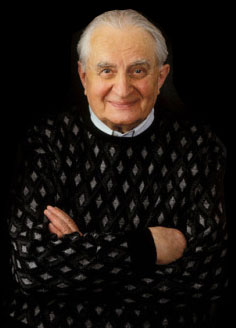 On April 26, 2017, the scientific community of mechanical engineers worldwide lost a renowned scientist and educator who dedicated his life to the development of the modern theory of gearing and made enormous contributions to the development of the theory of mechanisms.
On April 26, 2017, the scientific community of mechanical engineers worldwide lost a renowned scientist and educator who dedicated his life to the development of the modern theory of gearing and made enormous contributions to the development of the theory of mechanisms.
Professor Litvin had been recognized as an authority in kinematics and the theory of gearing. A whole epoch in the theory of gearing is concerned with the name of Professor Litvin. He is the author of one of the most fundamental and cited works in the field—a well-known monograph, The Theory of Gearing, which underwent six editions.
Born in Russia in 1914, Professor Litvin graduated from Leningrad Polytechnic Institute in 1937 with distinction. He defended his PhD in 1944, becoming a unique, self-educated PhD holder and later received his Doctor of Technical Science degree in 1954. From 1963, he served as department head and professor of mechanical engineering at the Institute of Precision Mechanics and Optics in Leningrad. He trained and supervised 100 PhD students (50 in Russia and, later, 50 in the U.S.) as well as visiting scholars from around the world. All of them went on to receive prominent teaching and research positions in the U.S., Italy, Spain, Russia, Bulgaria, Poland, Hungary, China, Taiwan, and Australia. With great pride, they consider themselves as belonging to the “elite school of Litvin".
In 1979, Professor Litvin emigrated to the U.S. and since then worked as a professor of mechanical engineering and director of the Gear Research Center at the University of Illinois at Chicago (UIC) until retiring at the age of 93. His contribution to the science of mechanical engineering is enormous. He actively worked in collaboration with NASA, the U.S. Army, and the U.S. rotorcraft industry for more than 25 years. He contributed significantly to the aerospace industry, with his technology valuable in the quest for reduced noise, vibration, and stress finding its way into the upgraded attack helicopter used by the U.S. Army. He had more than 350 publications, among them 10 monographs, and had multiple inventions—25 in the U.S. and one used in WWII.
Professor Litvin was an ASME Fellow, an associate editor of Computer Methods in Applied Mechanics and Engineering, and a member of the honorary editorial advisory Board of Gearing and Transmissions. He became a recipient of multiple awards, among them 12 from NASA; the Thomas Bernard Hall Prize Award from the Institution of Mechanical Engineers, UK; the Edison Award; and the IFToMM merit award (International Federation for the promotion of Mechanism and Machine Science). He was admired by many as distinguished, wise, cultured, and very kind. Many of his former PhD students believed that they owed him so much for their technical and human education, always inspiring them to read, to appreciate art, literature, and music.